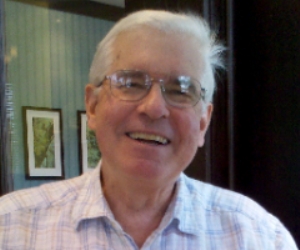From the evolution of the liberal arts education to free speech lawsuits, Chancellor professor of English Terry Meyers has seen it all in his 46 years at the College of William and Mary.
“One of the greatest pleasures I’ve had has been seeing the school become increasingly excellent,” Meyers said. “I’ve enjoyed being part of a school that has continual aspirations to be better than it has been.”
Meyers’s area of focus is Victorian English literature, and he is a specialist on Algernon Charles Swinburne, whom he calls “a bad boy of Victorian poetry.” He teaches classes on the Victorian era, as well as British Literature II, which is an introduction to 18th- and 19th-century British literature. The latter is a 200-level class required for English majors and is therefore largely comprised of underclassmen.
“I enjoy freshmen and sophomores,” Meyers said. “They come in with tremendous spirit and tremendous energy, and I also enjoy that range of literature.”
Meyers attended Lawrence University, a small liberal arts college in Appleton, Wisconsin, for his undergraduate degree. While he said he enjoyed the intellectual rigor of the school, he struggled with the initial transition period between high school- and college-level work.
“I remember my first English paper I got a D on. I’d been a straight-A student in high school, so I was stunned,” said Meyers.
He said he appreciated his professors’ high demands and closeness with students, which has influenced his current teaching style. Whenever a student performs below average on his own paper assignments, Meyers said he insists they discuss it with him to clarify what could be improved upon.
“I think students always rise to the standards you set,” Meyers said. “And I think one of the great things about liberal arts education is that it allows for curiosity. You’re put in touch with great thinkers, great writers, great painters, great musicians, and you can really immerse yourself in cultural experiences that take you out of yourself.”
Because of his time at both Lawrence University and the College, Meyers said he holds the unpopular opinion that a liberal arts education is very important.
“I saw on the Republican debate the attack on philosophers,” Meyers said. “A lot of people, and a lot of politicians, Democrats as well as Republicans, look on higher education as vocational training. They see it as job training, and I don’t think they understand the value of intellectual exploration, critical thinking, independent thinking, or the ability to write clearly and lucidly.”
While Meyers said he values the variety of activities a college experience offers, he said he primarily focused on his studies during his time at Lawrence.
He said that things changed in his junior year when he married his wife Sheila, who graduated from the College in 1978. They had their first child while he was in graduate school at the University of Chicago, and they had their second child when he began to work at the College.
It takes a special kind of person, in some ways, to teach at a place like William and Mary.
After graduating from the University of Chicago, Meyers arrived at the College in 1970 and said he immediately wanted to stay. At that time, teaching English meant Meyers was required to teach four courses per semester, as opposed to the two classes currently required. This limited professors’ time and focus to solely teaching, rather than allowing them time to do research.
Meyers said that the shift to allow professors more time to do research has been a major improvement at the College.
“It takes a special kind of person, in some ways, to teach at a place like William and Mary,” Meyers said. “You want someone who’s dedicated as a teacher but a serious scholar … you find people whose heart and soul is in teaching and research.”
One of Meyers’s most memorable experiences at the College was also a very dramatic one. In 1996, Virginia passed an act saying that state employees could not access sexually-explicit material on their college computers without the permission of the state. As a self-professed strong believer in the Constitution, Meyers said he objected to this law.
“All of a sudden I found I had to have permission of the state to read Swinburne online, to read Chaucer online, to read D.H. Lawrence online,” said Meyers. “I mean, there’s a lot of sexually-explicit stuff in English literature.”
Meyers ended up in a lawsuit alongside an American Civil Liberties Union attorney and plaintiffs from other colleges in the area. They cited the infringement of their First Amendment right to access the materials without first requesting approval from the government.
The day the suit was filed, Meyers said he received a threat to give up on the case.
“I got a call from one of the assistants to the president telling me that I could expect to be destroyed ‘professionally and personally,’” Meyers said. “He said the Governor’s going to get people to look into every nook and cranny of your life … and my stomach sort of turned over at that.”
Having tenure means that you can talk about, read about, think about, teach about things that are upsetting to the conventional mind.
Although they lost the suit and subsequent appeals, and he was known as “the porn prof” for a few years afterward, Meyers said he stands by his actions, citing the importance of tenure in the situation.
“Having tenure means that you can talk about, read about, think about, teach about things that are upsetting to the conventional mind. And that’s what a university is for,” Meyers said. “It’s an old theme, but carpe diem, seize the day … make the most of your day, intellectually and aesthetically … Follow your curiosity, study things in formal and even informal ways, and indulge yourself.”

